Real Madrid-Inter: una rivalidad grandiosa desde hace 57 a?os
Blancos y 'neroazzurri' se vieron las caras por primera vez en la final de la Copa de Europa 1963-64. Desde entonces, van 17 duelos y multitud de historias.
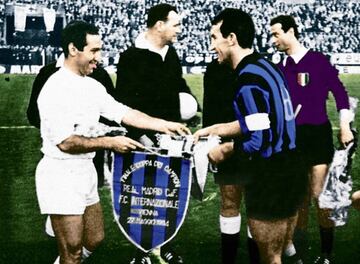
The final in Vienna
Inter Milan and Real Madrid come face to face once again on 15 September in Matchday 1 of the 2021/22 Champions League. It will be the 18th meeting between the two clubs and the latest installment in one of the oldest rivalries in continental football. They met for the first time in the European Cup final in 1964, at the old Praterstadion in Vienna; on that dayl Madrid where beaten 3-1 by Helenio Herrera's side. Sandro Mazzola, twice, and Milani were the scorers - rendering Felo's goal meaningless. That Madrid side featured some of the stars who had won the trophy five times on the trot, including Di St¨¦fano, Puskas and Gentol; two years earlier they had lost the final to Eusebio's Benfica in Amsterdam.
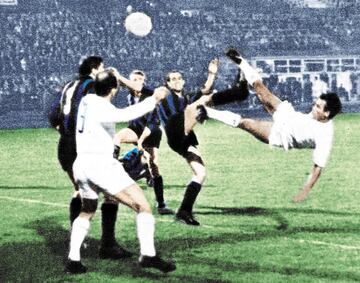
Inter make their mark in Europe
Felo pictured here firing in acrobatically to pull a goal back for Madrid to make it 2-1. Prior to that, Mazzola and Milani had scored for Inter; that triumph kickstarted their dominance in Europe under the guidance of Helenio Herrera, who perfected the defensive-counter attacking style which his counterpart at AC Milan, Nereo Rocco, had already implemented at San Siro. Playing for the Italians was Luis Su¨¢rez, the only Spanish-born footballer to have won the Ballon d¡¯Or (in 1960, while he was at Barcelona). A year later, in 1965 he was part of the Inter side which were crowned champions again, beating Benfica 1-0) at San Siro.
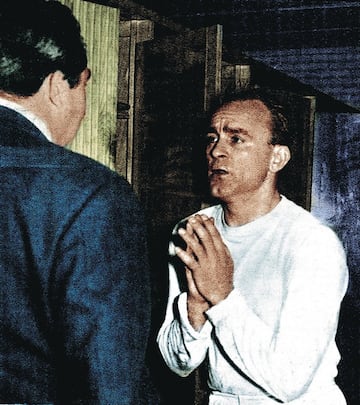
Di St¨¦fano¡¯s last game
That defeat in Vienna was significant in that it was also Alfredo di St¨¦fano¡¯s last game for Real Madrid. The Argentine legend had already had a few run-ins with coach Miguel Mu?oz, and a report was submitted to Bernab¨¦u ahead of the 1963-64 campaign, noting the players who would be leaving and the positions which needed reinforcing, Di St¨¦fano¡¯s name appeared on the sheet. News of his departure caused a heated discussion between Di St¨¦fano and Bernab¨¦u, which left such resentment that the Argentinean wouldn¡¯t return to work at Madrid until after the president¡¯s death. In the final at the Praterstadion, Di St¨¦fano reproached Mu?oz for his conservative tactics and obsession with stopping Fachetti. After 11 seasons at the club, Di St¨¦fano left to join Espanyol.
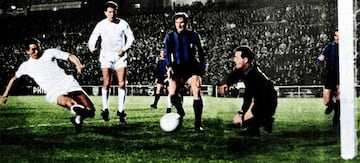
Pirri puts Madrid on course for sixth title
Two years after the final in Vienna, Madrid and Inter were back facing each other again in the European Cup - this time in the semi-final with Helenio Herrera¡¯s side looking to make the final for the third year running. But that Madrid side, known as the Ye-y¨¦ side, which featured only Spanish players, got their revenge and booked their place in the final at Heysel (Brussels) thanks to a 1-0 win in the first leg, with Pirri (pictured) hitting the winner. In the return at San Siro, Amancio opened the scoring on 20 minutes and Fachetti levelled on 78 minutes, too late to get Inter back into the tie. Mu?oz got his own back on Helenio Herrera and Madrid took on Partizan in the final. They beat the Belgrade-based rivals 2-1 to lift their sixth European Cup, six years after their last title.
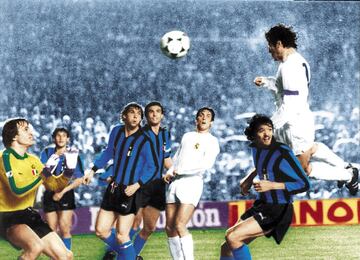
En route to Paris
Inter didn¡¯t have to wait long to avenge their disappointment from 1966; in the following edition, 1966-67, they beat Madrid home and away - winning 0-2 at the Bernab¨¦u and 1-0 at San Siro. That was followed by a period when the two clubs managed to avoid each other in Europe. It would be another 14 years before their next meeting - in the semi-final of the 1980-81 European Cup final. Once again Los Blancos won the home leg 2-0 at the Bernab¨¦u and withstood the pressure in Milan, where they fell 1-0. Madrid were back in the final but this time the outcome was very different as they were beaten 1-0 by Liverpool in Paris.
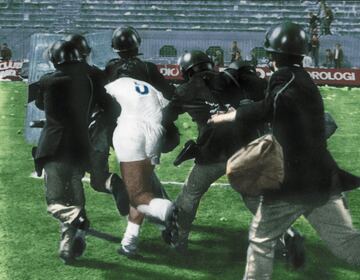
Enemies who know each other inside out
Real Madrid and Inter have met in various different competitions over the years: 11 times in the European Cup, four times in the UEFA Cup and twice in the European Cup Winners¡¯ Cup; this image is from the latter - the quarter finals which Madrid came through with a 1-1 draw at San Siro and a 2-1 win at the Bernab¨¦u, with goals from Salguero and Santillana. The overall balance of the 17 clashes between the two clubs is eight victories for Madrid, seven for Inter and two draws. In terms of ties, they could not be more equal: five wins each. As for overall wins in those ties, Madrid come out on top with five wins from the six two-legged ties between them.
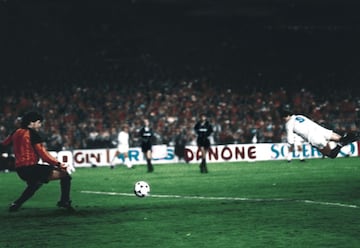
Madrid's historic comebacks
In the 1984-85 and 1985-86 seasons, Real Madrid won two UEFA Cups which, when looking at the teams they faced in the final (Videoton and Cologne), might not seem that impressive; but they had a number of obstacles to get over on the way to the title - including meetings with Inter at the semi-final stage. One of those meetings produced one of the great European comebacks in Madrid¡¯s history, and is remembered to this day for the ¡®Spirit of Juanito¡¯. In 1985, after losing 2-0 at San Siro, Madrid turned the tie around at home by winning 3-0; in 1986, Madrid returned from Italy following a 3-1 defeat, and the return leg at the Bernab¨¦u was taken to extra-time with Santillana scoring twice (one, pictured here) to make it 5-1 on the night.
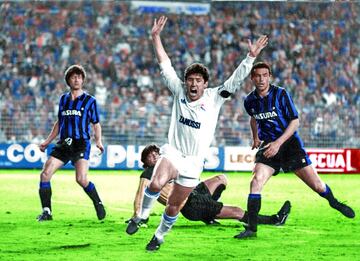
Santillana, nightmare for Inter
Carlos Alonso Gonz¨¢lez, known as Santillana in of his hometown (Santillana del Mar, Cantabria), deserves a special place in Inter and Madrid¡¯s shared history. The Italians suffered at the hands of several Madrid players during the 80s - Juanito, Butrague?o, Hugo S¨¢nchez¡ But none as much as Santillana, who fired six goals in six games against the Neriazzurri.
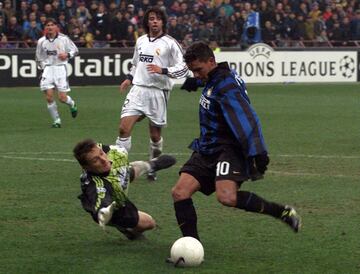
Age not an issue for Baggio
There was a lull in meetings between Inter and Madrid - 12 years passed without a game between the two until they were drawn in the same group in the 1998-99 Champions League. There was less at stake than in previous encounters but nevertheless, expectation was high for the two group games between the defending European champions (Madrid beat Juventus in the final in Amsterdam a few months earlier) and the UEFA Cup holders (Inter lifted the trophy after beating Lazio 3-0 in Paris). At the Bernab¨¦u, Madrid were by far the superior side - much of that was down to Savio Bortolini¡¯s exhibition display, which prompted Fresi¡¯s sending off before half-time and the penalty which Fernando Hierro converted to make it 1-0. Seedorf put the seal on the win in the final moments. Over in Milan, Inter pressed more, Ronaldo was vastly better than in the first leg and his strike took a lucky deflection off Zamorano; Seedorf equalised with a header and towards the end, the game was turned on its head by substitute Roberto Baggio. At 32, the veteran Italian forward scored twice inside four minutos.
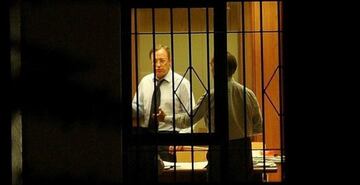
Nerves on deadline day
Relationships between Madrid and Inter took a turn after the events of the summer of 2002, when Ronaldo was voted the best player of the Japan/Korea World Cup. Not long after he had lifted the trophy he sent a message in Madrid¡¯s direction: "If they want me, call me. I am an Inter player, the three of us need to sit down to talk if Madrid decide to make a push for me". Inter president Massimo Moratti refused right from the start and Ronaldo rebelled by staying in Brazil. Florentino and Moratti met on 22 August in Formentera, a meeting in which the Italian admitted that the situation had become unsustainable for Inter; they started out asking for 60 million euros for Ronaldo, but were knocked down. Madrid ended up paying 45 million and the transfer went through at 23:30 hours on 31 August 2022. Pictured here, Florentino in the Bernab¨¦u offices working late into the night to close the operation before the transfer deadline.
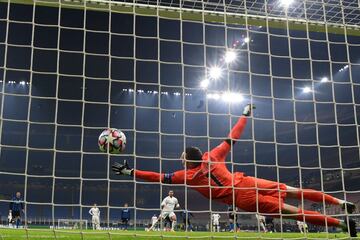
Madrid take San Siro
The most recent meeting between the two clubs came last season in the Champions League group stage. Madrid endured a tough time qualifying for the Last 16, but not for their performances against Inter. They won 3-2 in Valdebebas (with goals from Benzema, Ramos and Rodrygo) and 0-2 at San Siro (Hazard from the penalty spot and Rodrygo again). For the Italians, it could not have been more embarrassing - they finished bottom of the group behind Madrid, Borussia M?nchengladbach and Shakhtar Donetsk. But being knocked out of European competition did have its benefits, it left them free to concentrate on the league, allowing them to lift their first Scudetto in 11 years.
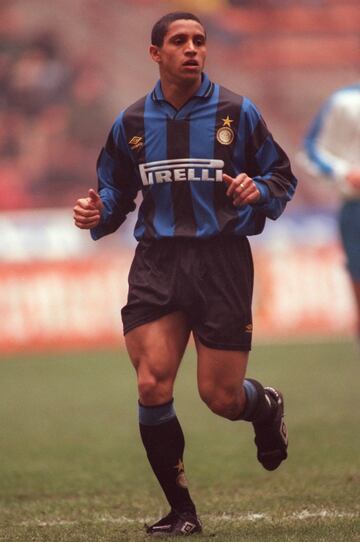
Roberto Carlos, un preciado regalo
El caso de Ronaldo fue el m¨¢s sonado, pero no el ¨²nico de trasvase de jugadores entre Inter y Madrid. Roberto Carlos, sin ir m¨¢s lejos, lleg¨® a Espa?a procedente de San Siro en 1996; no supieron ver en el Inter sus enormes cualidades como lateral atacante y su mala relaci¨®n con Roy Hodgson tampoco ayud¨®; cost¨® apenas 500 millones de pesetas, al cambio tres millones de euros. Del Madrid al Inter dieron el salto Solari y Figo, tambi¨¦n Sneijder y Cambiasso. Otros, como Etoo, jug¨® en ambos clubes, pero en medio tambi¨¦n en el Mallorca y el Barcelona. Seedord dej¨® el Madrid mediada la 1999-2000 para irse al Inter, cansado de los pitos del Bernab¨¦u; se perdi¨® ser parte del triunfo en Par¨ªs ante el Valencia para levantar La Octava. Y el ¨²ltimo ejemplo es el de Achraf, por el que el Inter pag¨® 40 millones en el verano de 2020; fue vital para ganar la Serie A y este verano lo traspas¨® al PSG por 60. Operaci¨®n redonda
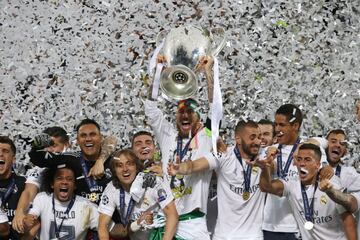
Number 11, against Atleti in Milan
And San Siro... Inter¡¯s stadium was always a tricky ground for Real Madrid, but that has changed in recent years - to the point where it witnessed one of the club¡¯s most historic nights. Madrid did not win any of their first seven visits to the Giuseppe Meazza (five defeats and two draws), but almost always managed to resolve the tie at home in the return leg. But in 2016, the team lifted their 11th Champions League there after a gripping meeting with Atleti which was resolved from the penalty spot; Juanfran missed and Cristiano scored the decisive kick. Last season, Madrid ran out 0-2 winners in Milan, brushing the hosts to one side during the group stage.



